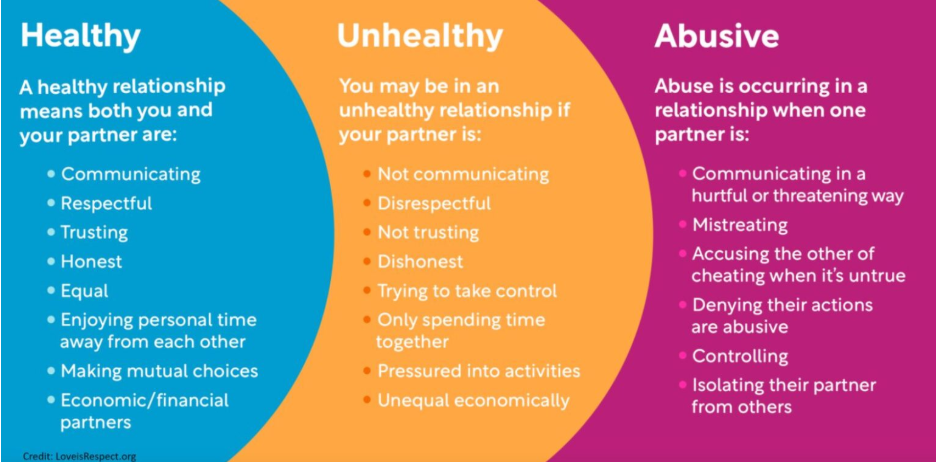University is a time of new connections. Whatever your background, identity, or experience, you deserve relationships that help you feel safe, respected, and free to be yourself. Learning about healthy relationships can help you feel more confident and support others too. You’re not expected to have everything figured out. What’s important is recognising what feels right for you and knowing that BPP is always here to support you.
Join us for Healthy Relationships Week 2025, taking place from 29th September to 3rd October. Open to all BPP students and learners.
What Do Healthy and Unhealthy Relationships Look Like?
Relationships aren’t always easy to define, especially when things feel confusing or uncertain. You don’t need to have all the answers to start thinking about what feels okay for you.
Here are some signs to help you reflect:
Healthy Relationships Often Feel Like:
- Respect – You feel valued, and your boundaries and identity are honoured.
- Trust – You feel safe and secure, not constantly worried or suspicious.
- Honesty – You can be truthful, even when it’s uncomfortable.
- Good communication – You’re listened to, and you can express yourself freely.
- Support for individuality – You’re encouraged to be yourself, pursue your interests, and maintain other relationships.
- Consent and comfort – In sexual relationships, you feel safe, respected, and never pressured.
Unhealthy Relationships Might Feel Like:
- Control – Someone makes decisions for you or limits who you spend time with.
- Fear or intimidation – You feel afraid to speak up, disagree, or set boundaries.
- Disrespect – Your opinions, identity, or needs are dismissed or mocked.
- Dishonesty – You’re lied to, manipulated, or kept in the dark.
- Isolation – You’re discouraged from seeing friends or family.
- Pressure or guilt – You’re made to feel bad for saying no or expressing discomfort.
- Unequal power – Your disability, mental health, or background is used against you.
Your Voice Matters: Building Relationships That Honour Who You Are
Everyone deserves relationships that feel safe, respectful, and empowering.
Whether you're navigating friendships, romantic relationships, or family dynamics, healthy relationships are built on emotional safety, personal autonomy, and mutual respect. Emotional safety means being able to express yourself without fear. These qualities help you feel secure in who you are and confident in how you connect with others.
For some students (including those with disabilities, neurodivergence, or marginalised identities) relationships can come with added challenges. You might worry about being misunderstood, judged, or excluded. But these conversations are for everyone.
What Do These Qualities Look Like?
Emotional Safety
You feel able to speak openly, share your thoughts, and express your feelings without fear of being judged, mocked, or punished. You’re listened to, even when you’re vulnerable.
Autonomy
You’re in control of your own choices. You can say no, set boundaries, and make decisions that reflect your values without being guilted, pressured, or manipulated.
Inclusion
Your needs (emotional, physical, sensory, social) are met with understanding and care. You’re not made to feel like a burden for asking for what helps you feel safe and supported.
Support Without Saviourism
Support means being there for each other, not trying to fix, control, or speak for someone. You’re seen as capable, and your voice matters.
The Relationship Spectrum: Healthy, Unhealthy, and Abusive
Relationships aren’t always easy to define. Not all relationships are clearly good or bad. They exist on a spectrum. Not every relationship that feels difficult is abusive, but it’s still okay to notice when something doesn’t feel right. You don’t need to wait for things to get worse before reaching out for support or talking to someone you trust. To explore this further, here’s a helpful framework from a national domestic violence charity that shows how relationships can exist on a spectrum.

Where to find Support
Internal Support
BPP has dedicated teams who can support you confidentially and without judgment.
Wellbeing & Mental Health Support
Safeguarding Team
- Help if you're experiencing or worried about abuse, harassment, coercion, or any form of harm. Trained staff will listen, support you, and connect you to appropriate services.
- Fill out the Student Welfare and Support form here.
- Email: safeguarding@bpp.com
- Urgent helpline: 07464 542 636 (Mon–Fri, 9:00am–5:30pm)
- If you are at immediate risk of harm, please call the emergency services on 999.
External Support (National & Specialist Services)
General Relationship & Abuse Support
LGBTQ+ Inclusive Resources
Neurodivergent & Learning Disability Support